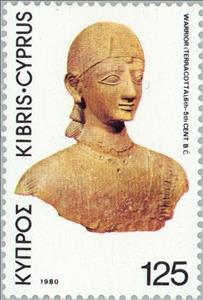Stamp: Terracotta Warrior, 6th-5th cent. B.C. (Cyprus 1980)
Terracotta Warrior, 6th-5th cent. B.C. (Cyprus 1980)
15 September (Cyprus ) within release Archaelological Treasures goes into circulation Stamp Terracotta Warrior, 6th-5th cent. B.C. face value 125 Cypriot mil
| Stamp Terracotta Warrior, 6th-5th cent. B.C. in catalogues | |
|---|---|
| Michel: | Mi:CY 532 |
Stamp is vertical format.
Also in the issue Archaelological Treasures:
- Stamp - Gold Necklace, Arsos, 7th cent. B.C. face value 10;
- Stamp - Bronze Cow, Vouni Palace, 5th cent. B.C. face value 15;
- Stamp - Amphora, Salamis, 6th cent. B.C. face value 25;
- Stamp - Gold finger-ring, Engomi, 13th cent. B.C. face value 40;
- Stamp - Bronze Cauldron, Salamis, 8th cent. B.C. face value 50;
- Stamp - Funerary Stele, Marion, 5th cent. B.C. face value 75;
- Stamp - Jug, 15th-14th cent. B.C. face value 100;
- Stamp - Terracotta Warrior, 6th-5th cent. B.C. face value 125;
- Stamp - Bronze relief, Lions attacking Bull, Vouni Palace, 5th cent. face value 150;
- Stamp - Faience Rhyton, Kition, 13th cent. B.C. face value 175;
- Stamp - Bronze statue of Ingot God, Engomi, 12th cent. B.C. face value 200;
- Stamp - Stone Bowl, Khirokitia, 6th Mil. B.C. face value 500;
- Stamp - Ivory Plaque, Salamis, 7th cent. B.C. face value 1;
- Stamp - Leda and the swan, Mosaic, Kouklia, 3rd cent. A.D. face value 2;
Stamp Terracotta Warrior, 6th-5th cent. B.C. it reflects the thematic directions:
Sculpture is the branch of the visual arts that operates in three dimensions. Sculpture is the three-dimensional art work which is physically presented in the dimensions of height, width and depth. It is one of the plastic arts. Durable sculptural processes originally used carving (the removal of material) and modelling (the addition of material, as clay), in stone, metal, ceramics, wood and other materials but, since Modernism, there has been almost complete freedom of materials and process. A wide variety of materials may be worked by removal such as carving, assembled by welding or modelling, or moulded or cast.
Archaeology or archeology[a] is the study of human activity through the recovery and analysis of material culture. The archaeological record consists of artifacts, architecture, biofacts or ecofacts, sites, and cultural landscapes. Archaeology can be considered both a social science and a branch of the humanities. It is usually considered an independent academic discipline, but may also be classified as part of anthropology (in North America – the four-field approach), history or geography

